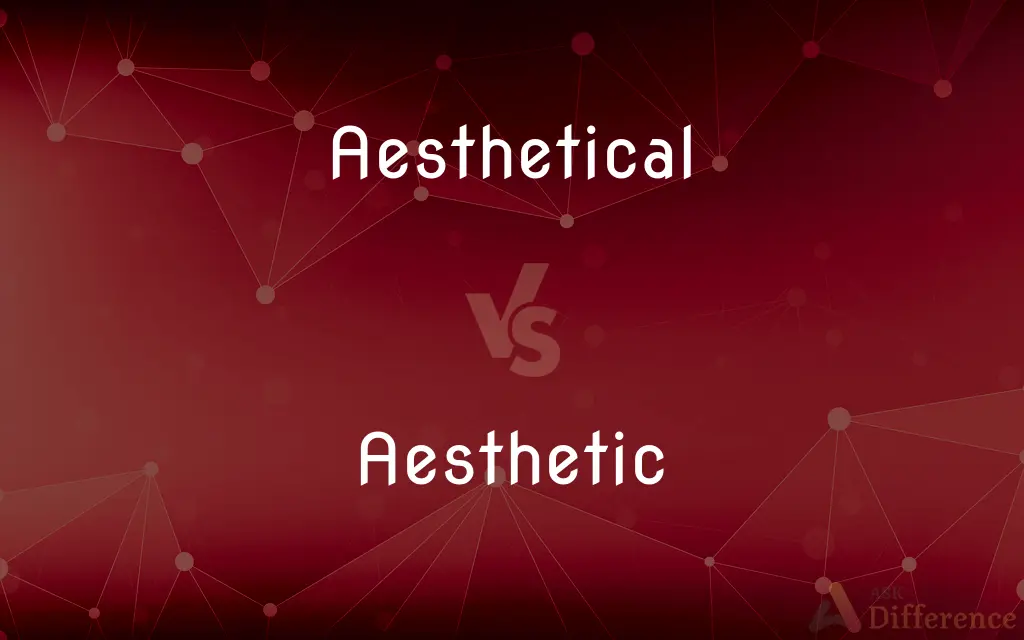Aesthetical vs. Aesthetic — What's the Difference?
By Tayyaba Rehman & Urooj Arif — Updated on April 5, 2024
Aesthetical relates specifically to the principles of aesthetics or beauty, focusing on theoretical or philosophical aspects, whereas aesthetic can refer broadly to matters of beauty, art, and taste in a more general and applied manner.

Difference Between Aesthetical and Aesthetic
Table of Contents
ADVERTISEMENT
Key Differences
Aesthetical often implies a closer association with the formal study or theory of beauty and art within philosophical realms. It tends to emphasize the intellectual framework behind what is considered beautiful or artful. On the other hand, aesthetic can be used more broadly to describe anything related to beauty, the appreciation of beauty, or the sensory-emotional values evoked by an object or experience. This term is more inclusive, covering the practical, everyday appreciation of beauty as well as its study.
Aesthetical is typically used in contexts that involve a deep dive into the criteria, philosophies, and theories that define what is aesthetically pleasing. It is more academic in tone. Conversely, aesthetic has a wider application, often found in everyday language to describe art, design, fashion, or even personal taste and preferences without necessarily delving into theoretical underpinnings.
In academic and critical discussions about art and beauty, "aesthetical" might be preferred to underscore the analytical or scholarly approach to the subject. It highlights an emphasis on understanding the underlying principles of aesthetics. Aesthetic, however, is more versatile, appearing in both casual and formal discourse to refer to visual appeal, stylistic elements, or the overall sensory impression something makes.
The term "aesthetical" can signal a more precise or specialized interest in the philosophy of art and beauty, indicating a discussion that might involve complex concepts and vocabulary. In contrast, "aesthetic" is accessible to a broader audience, encompassing everything from personal style to the critical appraisal of artworks without necessitating a deep theoretical background.
Though both terms originate from the same root in philosophy, dealing with notions of beauty and art, their usage reflects different degrees of specificity and context. "Aesthetical" aligns with a scholarly or theoretical approach to aesthetics, while "aesthetic" serves a wider range of conversations about art, beauty, and individual taste.
ADVERTISEMENT
Comparison Chart
Definition
Pertaining to the philosophy of aesthetics
Related to the appreciation of beauty
Usage Context
Academic, theoretical
Broad, including everyday contexts
Focus
Theoretical principles of beauty
Practical appreciation of beauty and art
Tone
Scholarly, specific
Versatile, general
Implication
Intellectual framework, philosophical
Sensory-emotional values, personal taste
Compare with Definitions
Aesthetical
Concerned with the criteria of artistic judgment.
Aesthetical debates often revolve around the subjective nature of beauty.
Aesthetic
Concerned with what is visually pleasing.
Her aesthetic sense influences her photography.
Aesthetical
Pertaining to the philosophical aspects of aesthetics.
Her thesis explores the aesthetical principles underlying modernist architecture.
Aesthetic
Relating to the appreciation of beauty and art.
The garden's aesthetic appeal is undeniable.
Aesthetical
Tied to academic discussions about art.
He is known for his contributions to aesthetical theory.
Aesthetic
Pertaining to the principles of beauty in art.
Modern designs prioritize functional over aesthetic considerations.
Aesthetical
Focused on the theoretical frameworks of beauty.
The aesthetical analysis of poetry reveals deeper layers of meaning.
Aesthetic
Involving the sensory-emotional values of an experience.
The aesthetic enjoyment of music can be profound.
Aesthetical
Relating to the formal study of art and beauty.
The professor's lecture on the aesthetical values of Renaissance art was enlightening.
Aesthetic
Relating to the philosophy or theories of aesthetics.
Aesthetical
Of or relating to aesthetics; relating to the philosophy or theory of beauty.
Aesthetic
Of or concerning the appreciation of beauty or good taste
Aesthetic judgment.
The aesthetic appeal of the exhibit.
Aesthetical
Of or pertaining to aesthetics.
Aesthetic
Attractive or appealing
The more aesthetic features of the building.
Aesthetical
Of or pertaining to beauty.
Aesthetic
Characterized by a heightened sensitivity to beauty
The poet and his aesthetic friends.
Aesthetical
Aesthetic.
Aesthetic
Being or relating to a work of art; artistic
The play was an aesthetic success.
Aesthetical
Concerning or characterized by an appreciation of beauty or good taste;
The aesthetic faculties
An aesthetic person
Aesthetic feeling
The illustrations made the book an aesthetic success
Aesthetic
(Informal) Conforming to accepted notions of good taste.
Aesthetic
Often Aesthetic Of or characteristic of aestheticism in the arts.
Aesthetic
A guiding principle in matters of artistic beauty and taste; artistic sensibility
"a generous Age of Aquarius aesthetic that said that everything was art" (William Wilson).
Aesthetic
An underlying principle, a set of principles, or a view often manifested by outward appearances or style of behavior
"What troubled him was the squalor of [the colonel's] aesthetic" (Lewis H. Lapham).
Aesthetic
Concerned with beauty, artistic impact, or appearance.
It works well enough, but the shabby exterior offends his aesthetic sensibilities.
Aesthetic
Beautiful or appealing to one's sense of beauty or art.
The design of the lobby cannot be considered particularly aesthetic.
Aesthetic
The study of art or beauty.
Aesthetic
That which appeals to the senses.
Aesthetic
The artistic motifs defining a collection of things, especially works of art; more broadly, their aura or “vibe”.
Her most recent works have this quirky, half-serious ’90s teen culture–inspired aesthetic.
I really like the goth aesthetic you've got going there.
Aesthetic
Of or Pertaining to æsthetics; versed in æsthetics; as, æsthetic studies, emotions, ideas, persons, etc.
Aesthetic
(philosophy) a philosophical theory as to what is beautiful;
He despised the esthetic of minimalism
Aesthetic
Relating to or dealing with the subject of aesthetics;
Aesthetic values
Aesthetic
Concerning or characterized by an appreciation of beauty or good taste;
The aesthetic faculties
An aesthetic person
Aesthetic feeling
The illustrations made the book an aesthetic success
Aesthetic
Aesthetically pleasing;
An artistic flower arrangement
Common Curiosities
Why might someone prefer to use "aesthetical"?
Someone might use "aesthetical" to emphasize a scholarly or theoretical approach to discussing art and beauty.
Can "aesthetic" and "aesthetical" be used interchangeably?
While they share a common root and can sometimes overlap in meaning, their usage typically depends on the context—academic or theoretical versus broad and general appreciation.
Can something be aesthetical but not aesthetic?
Theoretically, something could be considered "aesthetical" in a philosophical or scholarly sense without necessarily being "aesthetic" or widely regarded as beautiful in a general sense.
Is "aesthetic" more commonly used than "aesthetical"?
Yes, "aesthetic" is more commonly used in everyday language due to its broader application to anything related to beauty and art.
How does personal taste factor into the discussion of aesthetic versus aesthetical?
Personal taste is more closely aligned with "aesthetic," which encompasses individual preferences and perceptions of beauty, rather than "aesthetical," which is concerned with theoretical understandings.
How does culture influence aesthetic and aesthetical values?
Culture significantly shapes what is considered beautiful or aesthetically pleasing, influencing both individual aesthetic preferences and theoretical aesthetical frameworks.
What is the main difference between aesthetical and aesthetic?
Aesthetical is more closely tied to the theoretical and philosophical study of beauty, whereas aesthetic broadly covers the appreciation and principles of beauty in art and nature.
How does the usage of "aesthetic" differ in art compared to everyday life?
In art, "aesthetic" refers to the principles and philosophy of what is considered beautiful or artful, whereas in everyday life, it can refer to anything perceived as visually pleasing or stylish.
Is the study of aesthetics always considered "aesthetical"?
Yes, the study of aesthetics, particularly in an academic or philosophical context, is considered "aesthetical."
Do "aesthetic" and "aesthetical" share the same origin?
Yes, both terms originate from the Greek "aisthētikos," relating to sensory perception and appreciation of beauty.
Does the digital world influence our understanding of aesthetic and aesthetical values?
Absolutely, the digital world expands the context in which we understand and apply both aesthetic and aesthetical values, influencing everything from digital art to web design.
How do fashion and design relate to aesthetic and aesthetical values?
Fashion and design are fields deeply rooted in aesthetic values, focusing on visual appeal and style, though they can also be discussed from an aesthetical, theoretical standpoint.
Can the environment have an aesthetic or aesthetical value?
Yes, environments can possess both aesthetic and aesthetical values, depending on whether the appreciation is based on sensory experience or theoretical analysis.
Are aesthetic judgments subjective or objective?
Aesthetic judgments are largely subjective, based on personal taste and cultural influences, though aesthetical studies often seek to understand the underlying principles that might suggest a more objective basis.
Can the concept of beauty evolve over time within aesthetic and aesthetical discourse?
Yes, concepts of beauty are dynamic and evolve over time, influenced by cultural shifts, artistic movements, and theoretical developments in both aesthetic and aesthetical discourse.
Share Your Discovery

Previous Comparison
Attractive vs. Engaging
Next Comparison
Muslin vs. LinenAuthor Spotlight
Written by
Tayyaba RehmanTayyaba Rehman is a distinguished writer, currently serving as a primary contributor to askdifference.com. As a researcher in semantics and etymology, Tayyaba's passion for the complexity of languages and their distinctions has found a perfect home on the platform. Tayyaba delves into the intricacies of language, distinguishing between commonly confused words and phrases, thereby providing clarity for readers worldwide.
Co-written by
Urooj ArifUrooj is a skilled content writer at Ask Difference, known for her exceptional ability to simplify complex topics into engaging and informative content. With a passion for research and a flair for clear, concise writing, she consistently delivers articles that resonate with our diverse audience.














































